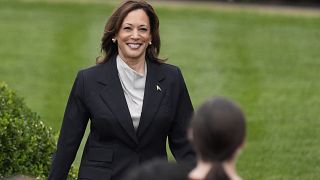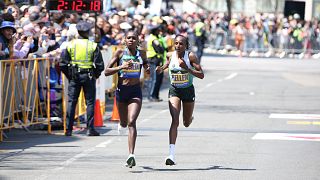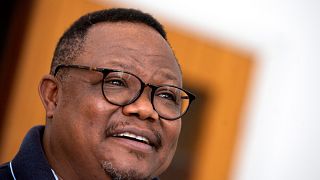USA
With President Joe Biden ending his reelection bid and endorsing Vice President Kamala Harris, Democrats now must navigate a shift that is unprecedented this late in an election year.
Democrats are set to hold their convention in Chicago in August.
What was supposed to be a coronation for Biden now becomes an open contest in which nearly 4,700 delegates will be responsible for picking a new standard-bearer to challenge Republican Donald Trump in the fall.
"This is quite obviously such a moment in American politics and American history," said Bill Barrow, The Associated Press' National Political Reporter. "There's not an obvious precedent."
The path ahead is neither easy nor obvious, even with Biden endorsing Harris. There are unanswered questions about logistics, money and political fallout.
Biden won every state primary and caucus earlier this year and only lost the territory of American Samoa. At least 3,896 delegates had been pledged to support him.
Current party rules do not permit Biden to pass them to another candidate. Politically, though, his endorsement is likely to be influential.
With Biden stepping aside, Democrats technically start with an open convention. But realistically, his endorsement pushes Democrats into murky territory.
The immediate burden is on Harris to solidify support across almost 4,000 delegates from the states, territories and District of Columbia, plus more than 700 so-called superdelegates that include party leaders, certain elected officials and former presidents and vice presidents.
Even before Biden announced his decision, Democrats floated California Gov. Gavin Newsom and Michigan Gov. Gretchen Whitmer as potential contenders in addition to Harris. Yet some Democrats argued publicly, and many privately, that it would be a no-brainer to elevate the first woman, first Black woman and first person of south Asian descent to hold national office.
Given how important Black voters -– and Black women especially -– were to Biden’s nomination and his choice of Harris as running mate, it would be risky, to say the least, for Democrats to pass her over for a white nominee. Democrats already faced historical headwinds before Biden's withdrawal. Newsom and Whitmer, both of whom are white, and any other Democrat would also have to weigh the short-term and long-term benefits of challenging Harris now versus preserving goodwill for a future presidential primary.
The vice presidential nomination is always a separate convention vote. In routine years, the convention ratifies the choice of the nominee. If Harris closes ranks quickly, she could name her choice and have the delegates ratify it. In an extended fight, though, the vice presidency could become part of horse-trading — again, a return to conventions of an earlier era.











Go to video
South Africa's Ramaphosa holds phone call with Trump, to meet 'soon'
Go to video
Trump says U.S. and China will 'get along great'
Go to video
South Sudan to send delegation to the U.S. in a effort to appease tensions
Go to video
Kinshasa reacts to Trump's claim that 'many' Congolese come to US
Go to video
Iran, US confirm third round of nuclear talks in coming week
00:58
Trump administration plans to shut down nearly 30 U.S. embassies — over half in Africa